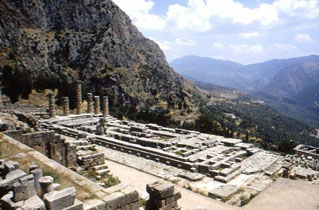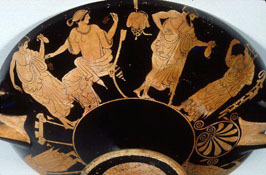|
||||||||||||
|
||||||||||||
|
|||||||||||||||||||||||
Beginning Ancient Greek III |
||||||||||||||||||||||
|
|
 Temple of Apollo, Delphi Instructor: David Carlisle, College Hall 310, x4843, dcarlisle@cornellcollege.edu Class meetings: M W F 9:30-11 a.m. and 1:30-3:00 p.m.; T Th 9-11 a.m. and 1-3 p.m. Office Hours: M W F 1-2 p.m. and always by appointment. Required Materials
Course GoalsThe main goal of the course is to improve your ability to communicate, both in Greek and in English, to become sensitive to the nuances of language. More specifically, you will learn:
All of these will work together to enable you to READ GREEK with some degree of fluency by the end of your third term. Preparation for classSince several weeks have intervened since 102, you will undoubtedly feel rusty. Be assured that your knowledge of Greek will come back. Don't feel that you need to review everything all at once. Steady, daily, systematic review is the best way to insure recall of old material and mastery of new. Therefore, every day spend time reviewing vocabulary and grammar. Second, spend time reading connected prose, re-reading it, listening to the tapes. Third, practice by composing sentences that use new vocabulary, new sentence patterns, new grammar, and by doing on-line drills, Gramma exercises, Ariadne activities, and other homework. If you are an active learner, using all your senses and motor skills, you will learn Greek much more easily, and best of all you will retain it! Ariadne: Resources for Athenaze Ariadne: Resources for Athenaze follows Athenaze chapter by chapter. Activities from Ariadne are part of the assigned homework each night. Ariadne includes:
Gramma and other on-line exercises Gramma is available on all public-access computers on campus. Gramma consists of three HyperCard stacks that allow you to review vocabulary (Mnemonika); nouns, adjectives, and pronouns (Onomata); and verbs (Rhemata). The advantage of using Gramma to practice vocabulary and paradigms is that you will learn immediately whether your answer is right or wrong. Gramma lets you work at your own pace. It doesn't mind how long you take to answer or how many times you do an exercise. It is best, however, not to try Gramma until after you have studied the grammar in your textbook first. In addition to Gramma there are on-line programs available for Grammar practice. See the On-line Exercises section on the Greek Links page for more exercises. Story writing:During the first week, you will write a summary of the story of Philip's trip to Epidauros and back, entitled ho nostos tou Philippou. As usual, the story writing will be graded on comprehensibility (e.g. is the grammar reasonably correct) and coherence (does the story flow from one paragraph to the next, use the proper transitional words, etc.). The purpose of this assignment is to review the readings and vocabulary for Chapters 17-21a. Thus, it is permissable to use the words and structures in the readings. Yet there is a small twist. You should write the story as much as possible from Philip's point of view. What would he include (or not). How would he explain each event? What attitude does he have toward the people they met and situations they encountered (that might be different from Dikaiopolis' point of view). Second, Philip's audience will be Melitta and Myrrhine. What would Philip tell them and what would they want to hear about? You should write on average about one paragraph per chapter. The final draft should be double spaced, typed (if possible), and use one-inch margins. This assignment is due on the fifth day of the term. TestsThere will be two tests (a midterm and a final). Each one will include oral comprehension questions, questions on the grammar and vocabulary, a reading comprehension section, a writing component, and a culture essay (in English). CommentaryThere will be two further projects, besides tests, that will help you appreciate ancient Athens and the Greek language: a commentary on a passage (30-40 lines long), demonstrating your knowledge of the general background, the genre, meter (if poetry), grammar, allusions, and cultural context of the passage. In the process you will become familiar with a particular author's works and style since you will need to read through some of his works in order to find the appropriate passage. Symposion ProjectThe second project is a creative project that you (or a small group) will present at our final symposion. It may be artistic, musical, poetic, dramatic, satiric, philosophic. It may be from the Greek world or may take the Greek world as its inspiration. In the past, students have performed skits, rewritten popular songs, staged scenes from Greek plays, or created games. More on this later.
 Kylix (Side A), Toledo Museum of Art
Course Requirements and Grading
Since one quiz can be dropped, there will be no make-up quizzes. There will be an oral component to the exams as well as questions on the cultural readings. Letter grades will be assigned according to the following pattern:
Final Note: Do not get behind at any time. Ask for help before you feel you are slipping.
|
|||||||||||||||||||||
|
||||||||||||
|
||||||||||||